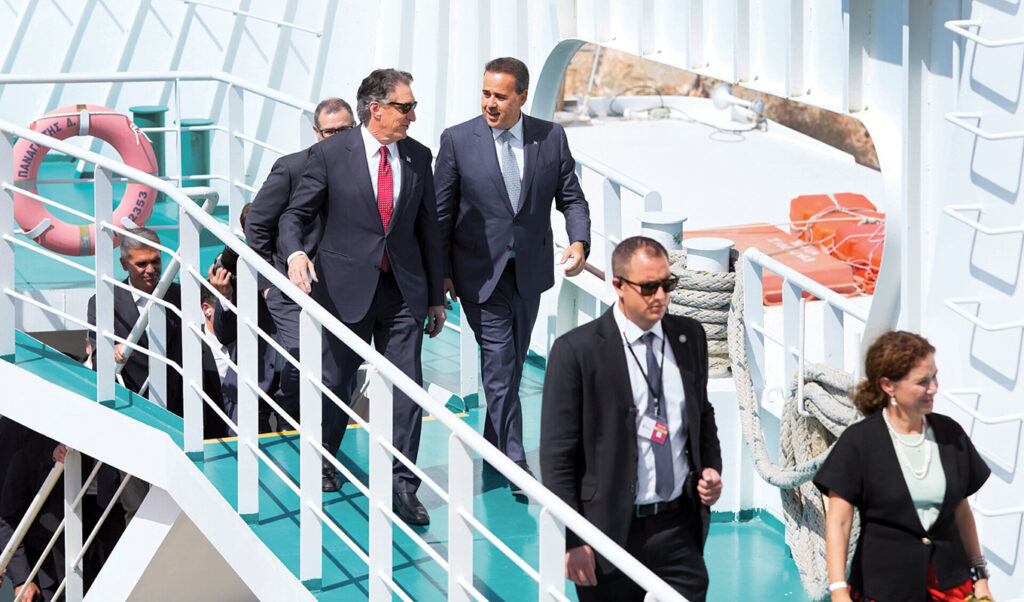The Black Sea, the Bosphorus and the Dardanelles are traditionally and historically the maritime commercial axis that transports goods and products -including natural gas– from and to Russia to Europe and, crossing the Mediterranean, to North Africa. The tectonic developments created by the Russian invasion of Ukraine three and a half years ago are leading, among other things, to a change in this regime, which could prove to be of historic dimensions under certain terms and conditions.
With the so-called Vertical Corridor, natural gas will reach from Alexandroupoli to Odessa -bypassing the Bosphorus straits- through the natural gas transmission pipeline from Greece to Bulgaria and then Romania, Hungary, Slovakia, Moldova and Ukraine. This project, of high commercial and geopolitical importance, has the support of Washington, which recognizes that the Revithoussa LNG terminal and the new floating regasification and natural gas storage unit in Alexandroupoli allow the US to export more natural gas to Europe, mainly through the Vertical Corridor, in which they are also reportedly considering participating as investors.
Within this framework, two top officials of the Trump administration are coming to Athens this week, Interior Minister and head of the National Council for Energy Sovereignty, Doug Bergum, and Energy Secretary, Chris Wright. On Thursday and Friday they will participate at Zappeion in the Partnership for Transatlantic Energy Cooperation (P-TEC), a forum established on the initiative of former US Energy Secretary Rick Perry, within the framework of the Three Seas Initiative. The goal of P-TEC is to strengthen energy interconnectivity, security and cooperation between Central and Eastern European countries and the United States. This American initiative focuses on common energy infrastructure (electricity networks, pipelines, transportation), with the aim of creating a sustainable, resilient and cooperative energy market that will bring economic, environmental and social benefits.
New opportunities opening for Greece
The choice of Athens for the PTEC meeting, the simultaneous presence of these two specific ministers and the statements they are expected to make reinforce the US strategic choice to invest in Athens as a future energy hub for the broader region. A few days ago, the energy ministers of the European Union member states approved the new REPowerEU regulation, which provides for the gradual ban of all Russian natural gas imports (via pipelines and ships) by January 1, 2028. From then on, Europe’s natural gas market closes definitively to Russia and new opportunities also open for the US, which wants to utilize our country as a key entry point for American natural gas into the European market.
In recent statements, Mr. Bergum pointed out that “the Prime Minister of Greece fully understands the issue of energy independence and is absolutely supportive. Greece is an excellent partner of the United States,” while emphasizing that “the idea of the North-South axis, which also starts from Greece, combined with its participation in the ‘3+1’ scheme, creates tremendous opportunities to break Eastern Europe’s energy dependence on Russia.” “Greece on November 6 and 7 will be at the center of international energy developments,” emphasizes Environment and Energy Minister Stavros Papastavrou, speaking to “P”, who has been working methodically over the last six months on this planning, as well as on the other plan that also attracts high American interest, the extraction and utilization of hydrocarbons south of Crete and the Peloponnese, by ExxonMobil and Chevron, in cooperation with HELLENiQ Energy.
“The meeting of ministers of the Partnership for Transatlantic Energy Cooperation (P-TEC), hosted by the Greek government, will bring together more than 25 Energy ministers from both sides of the Atlantic -including Interior Secretary Doug Bergum and US Energy Secretary Chris Wright-, as well as over 400 high-ranking American and European officials and company representatives,” notes Mr. Papastavrou in the same statement and adds: “Beyond the undisputed business value, this event highlights the geopolitical position of our homeland as a strategic energy partner of the US in the broader region of the Southeastern Mediterranean. Following Chevron’s participation with HELLENiQ Energy in hydrocarbon exploration in four of our maritime areas, energy emerges as a lever for upgrading our country’s role and further strengthening our excellent bilateral relations.”
Competitive market
On the first day of P-TEC, Thursday, participating ministers, institutional representatives, international organizations and executives from leading energy sector companies from America, Europe and Greece will discuss new energy trends and shaping conditions for a secure, sustainable and competitive energy market. The proceedings are opened by Mr. Papastavrou and Wright with their presentations, while it’s worth noting that among the thematic sections to be discussed in the panels include: the role of natural gas in Europe’s new energy geography, the Vertical Corridor of natural gas, attracting capital for energy infrastructure investments, energy’s contribution to Artificial Intelligence development, strengthening energy systems resilience and emerging technologies.
Of particular importance is the panel dedicated to Greece, where Mr. Papastavrou will present achievements as well as long-term and medium-term planning in the energy sector. It’s also worth recalling a by no means coincidental reference made by Kimberly Guilfoyle in mid-July, during the hearing she passed through the relevant Senate Committee, when her appointment as US Ambassador to Athens was approved. “The United States and Greece have made tremendous progress in energy cooperation. Greece’s Revithoussa LNG terminal and the construction of the floating regasification and storage unit in Alexandroupoli allow the US to export more natural gas to Europe,” she characteristically stated before the senators, attributing special importance to the fact that “there are tremendous opportunities for selling more American energy to Greece and its neighbors.”
Published in Parapolitika




